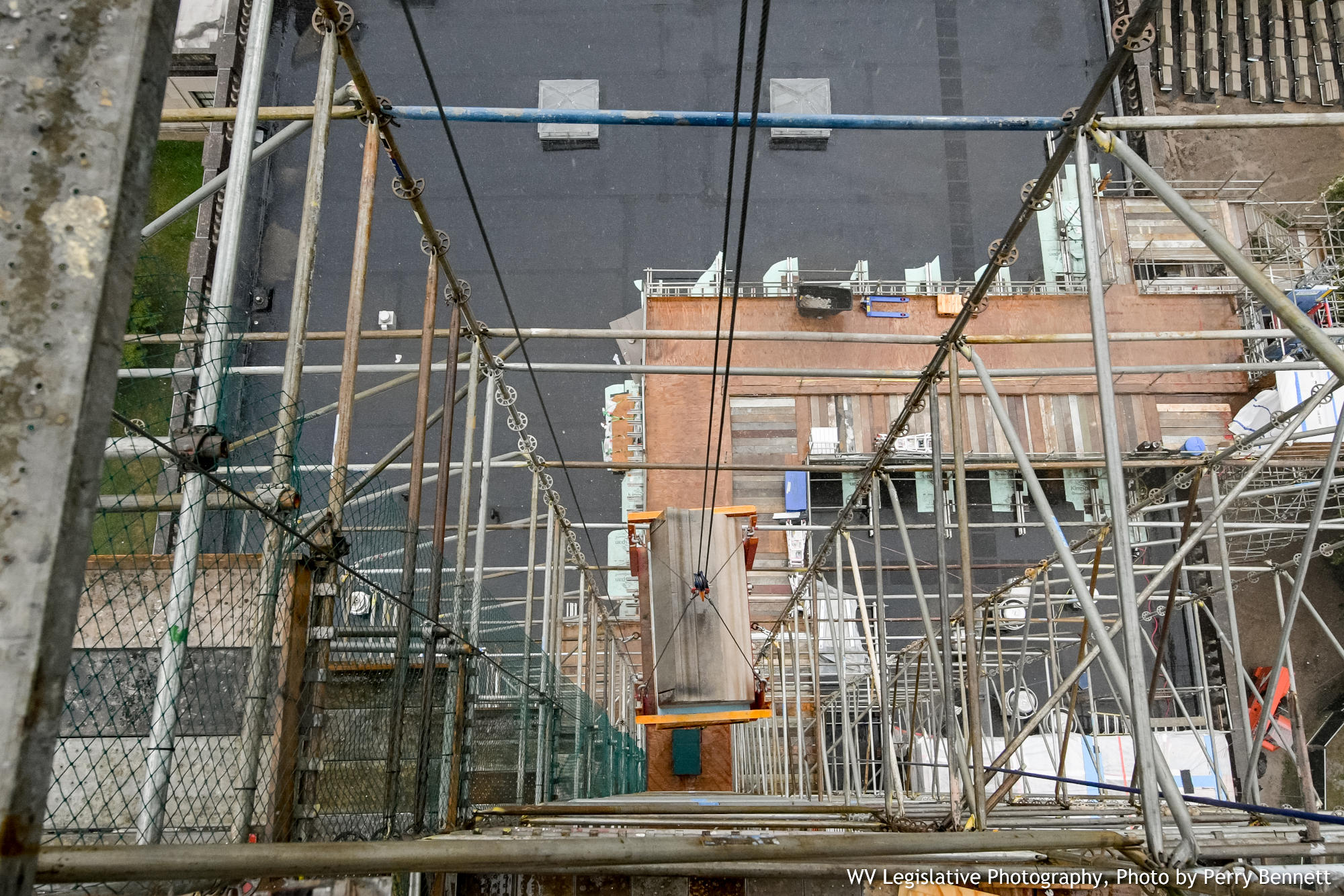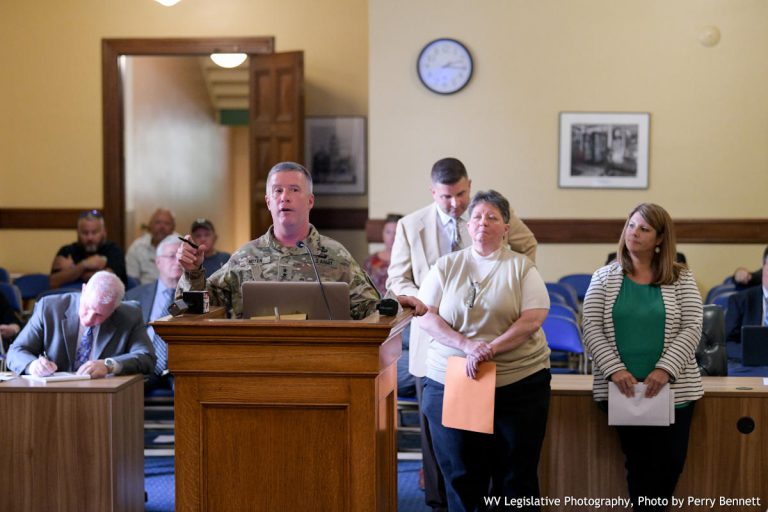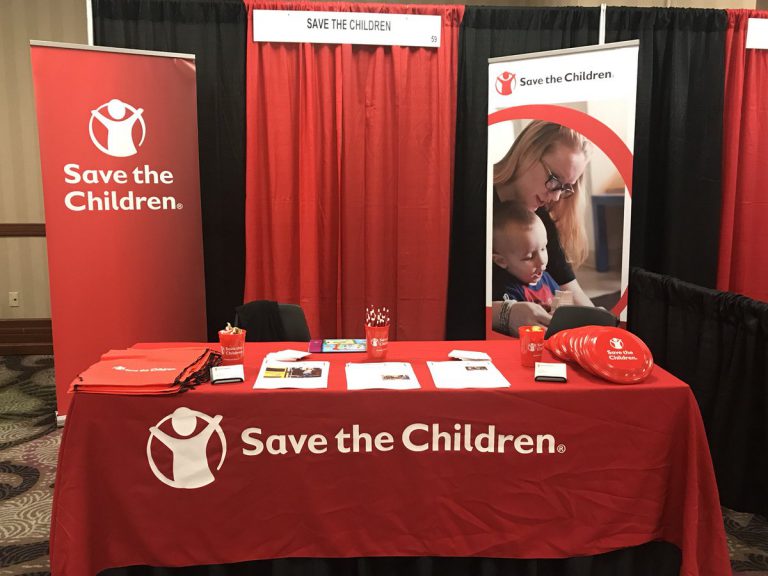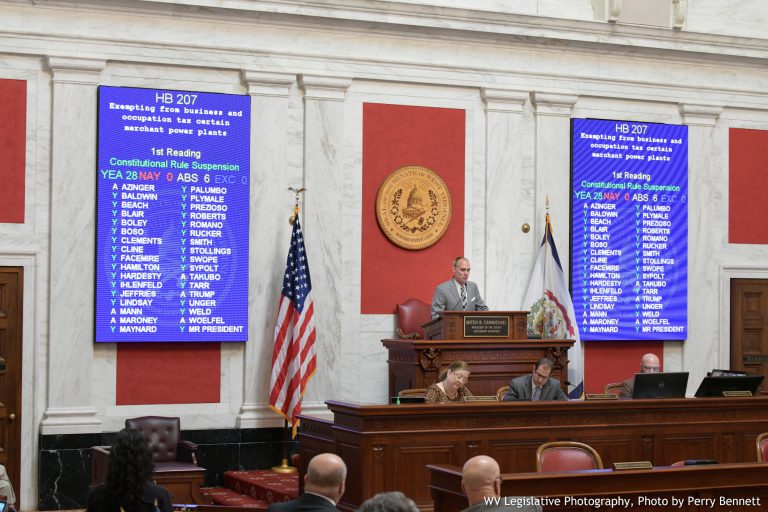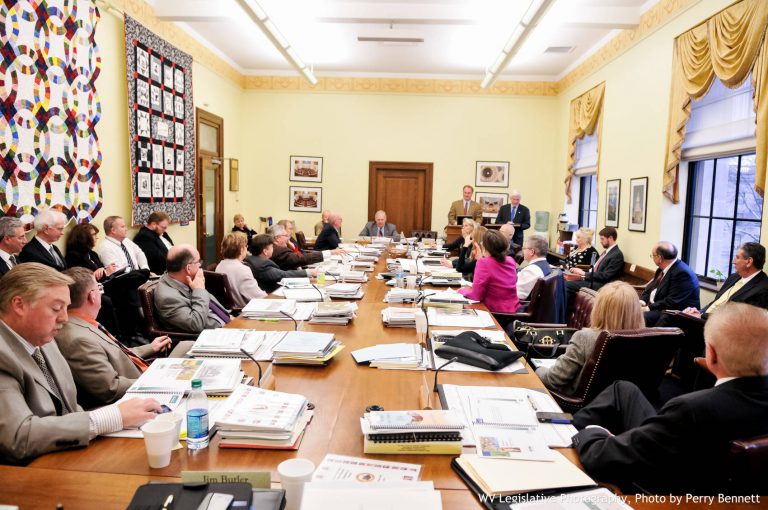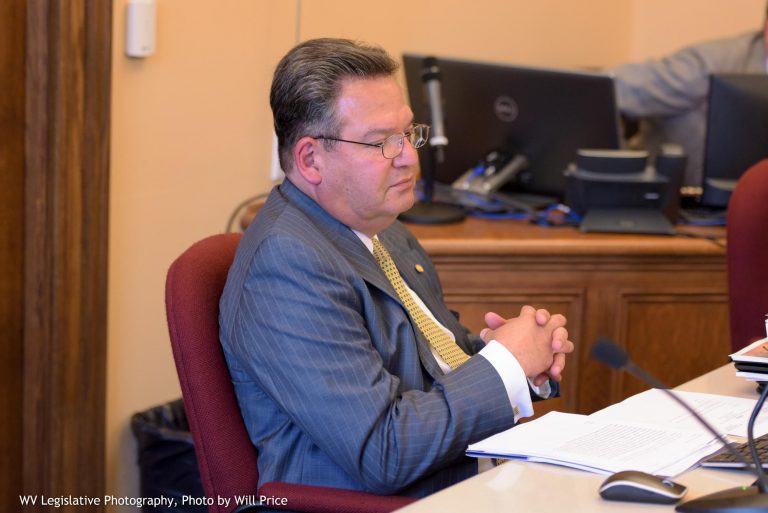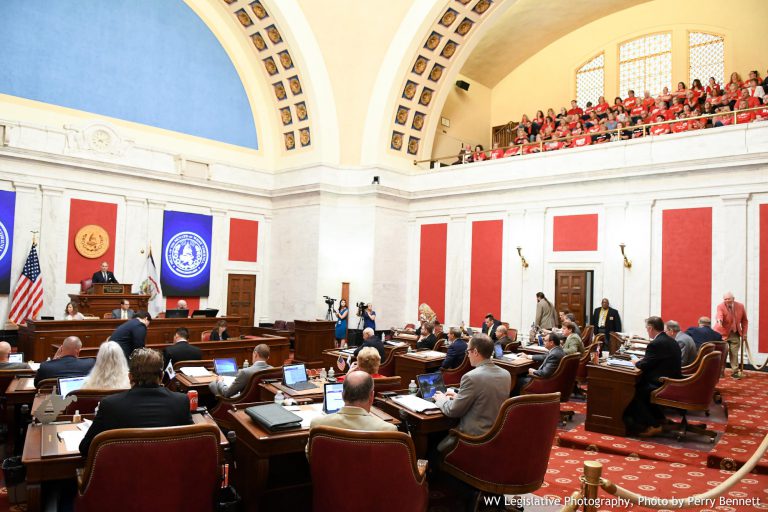Workers have finished removing three rows of large limestone blocks from the spring line. This will allow workers to get to the area behind the blocks to install water-proofing measures. Until now, water cascaded down the dome, seeping behind the limestone blocks, and making its way into the rotunda area, causing damage.
Hoyer: 500 cases previously closed out need review
Maj. Gen. James Hoyer updated the Joint Committee on Flooding Wednesday on the progress of home construction and rehabilitation for homes destroyed or damaged from the 2016 floods.
Hoyer said case management numbers have fluctuated for a few reasons. He noted 500 cases closed out by a previous contractor are now being reviewed to see whether they could be re-opened. Hoyer pointed out two-to-three cases, in particular, that the contractor closed but had no reason listed for that closure. He said there also were cases of smaller dollar amounts that could be reopened.
Since June, active cases have gone down from 479 to 397. Hoyer said some of those cases have come off the list because duplication of benefits found upon review and some cases had income levels outside of HUD requirements for funding.
Of those active cases, 250 are reconstructions, 39 are rehabilitations, 100 are mobile home replacements, eight are unassigned projects, and 59 have been completed. There have been 314 cases awarded contracts for work, 42 are in the request for proposal process, and 41 cases in the review process that Hoyer estimates will go to purchasing by the end of the month.
Hoyer also told the committee there have been challenges in getting vendors to bid for the projects. Only two to three vendors have been bidding on these projects.
PEIA Director Details Financial Status, Change in Salary Brackets
The West Virginia Public Employees Insurance Agency has had a good year, the director told legislators Tuesday.
Ted Cheatham, director of PEIA, updated members of the Select Committee on PEIA, Seniors and Long Term Care on PEIA’s financial status and changes in salary tiers.
On the active member side, PEIA had a surplus of more than $30 million, which was put into a premium reserve for future costs. For retirees, Cheatham said they are behind as of a couple of months ago because of stock investment returns but he anticipated this could turn around.
Salary tiers were increased $2,700 across all 10 salary brackets to prevent employees who got a pay increase from moving up another salary tier. An estimated 15,000 people could have moved up another salary tier as a result of the raise.
About 3,000-4,000 people went down a tier, which Cheatham anticipated could cost the plan about $3 million.
Active members have decreased and retirees have increased. Cheatham anticipated little effect on PEIA or financials from this. The active plan lost about 5,000 members through the last five years, averaging about 1,000 members a year. Of those 5,000, about 1,000 came from higher education, 1,000 from state employees, and 3,000 from boards of education.
Save the Children Hopes to Expand Journey of Hope Program
A representative from Save the Children told lawmakers she hopes to expand a program aiming to build resiliency in children and families.
Angie Boggs, director of West Virginia Save the Children, and Erika Blackburn, Journey of Hope Program Specialist, presented an overview on the organization and plans for the future in Tuesday’s Joint Committee on Children and Families meeting.
Save the Children, a 501 (c)(3) organization, has been in West Virginia since 2010. It provides services including programs to help kids get ready for Kindergarten and increase literacy and math skills with the goal of proficiency by third grade.
Another program, Journey of Hope, aims to build resiliency and coping skills in children and families. The Tulane School of Public Health in cooperation with Save the Children developed this program following Hurricane Katrina with the overall goal of supporting families following natural disasters.
The organization brought the program into West Virginia in 2016 after the devastating flooding that affected the state.
Blackburn said in addition to helping families who have experienced natural disasters, the program also aims to help families and children affected by the opioid crisis.
Blackburn told the committee that evaluations done on the program have showed a 30 percent reduction in behavioral referrals.
The program currently is in 33 counties in West Virginia and Blackburn said they are working with a Family Resource Network in Lewis County and the Harmony House Child Advocacy Center in Ohio County.
Blackburn said the organization partners with school districts and works with Family Resource Networks. Journey of Hope is an eight-week program where school staff members are trained to assist families going through continuous, toxic stress. According to Save the Children’s website, the goal of the program is to help families cope with traumatic events, build resiliency, and strengthen support networks.
—
The committee also heard from Carrie Stalnaker about the Mutual Consent Adoption Registry. Stalnaker told the committee the database has documented applicants since 1994 and averages 30 applicants a year.
Legislators asked questions about releasing identifying information in certain cases. Stalnaker said she can provide information only after confirmation that both parties have participated in an hour-long reunification counseling session and can then, she can only provide current contact information. She said the law does not permit her to assist in sibling searches.
Senate Completes Bill to Eliminate Tax Burden on Pleasants Power Station
The Senate acted quickly Tuesday afternoon, unanimously passing House Bill 207, which eliminates the business and occupation tax for all merchant power plants, and specifically, the Pleasants Power Station.
The legislation defines a merchant power plant as “electricity generating plant in this state that is not subject to regulation of its rates by the West Virginia Public Service Commission, sells electricity it generates only on the wholesale market, does not sell electricity pursuant to one or more long-term sales contracts, and does not sell electricity to retail consumers.”
The tax has brought in about $12.5 million a year for the state.
The Longview Power Plant, also a merchant plant, has a local exemption, which has created a unique tax burden for the Pleasants Power Station, according to lawmakers and officials. Lawmakers acted quickly to ease this burden and create a level playing field.
Also on Tuesday, the Senate completed action on HCR 104 and HCR 105, resolutions that approve the draw down of an additional $800 million in road bond money.
The Senate has adjourned subject to the call of the President.
House Passes Bill Exempting Power Plant from B&O Tax
The House passed a bill Tuesday that would exempt the FirstEnergy Pleasants Power Station from the business and occupation tax.
Gov. Jim Justice added the bill along with other measures in a fifth amended special session call. The bill was read a first time Monday and referred to the House Finance Committee, which advanced the bill that evening.
The House took up House Bill 207 for immediate consideration and suspended the constitutional rules requiring that the bill be read on three separate days.
The bill would exempt merchant power plants from the business and occupation tax. It defines a merchant power plant as “electricity generating plant in this state that is not subject to regulation of its rates by the West Virginia Public Service Commission, sells electricity it generates only on the wholesale market, does not sell electricity pursuant to one or more long-term sales contracts, and does not sell electricity to retail consumers.”
The exemption originally was set to go into effect July 1, 2020. However, the House adopted an amendment that would move up the effective date to Jan. 1, 2020.
The FirstEnergy Pleasants Power Station in Willow Island is classified as a merchant power plant. The governor said in a press release he wanted the bill to keep the power plant from closing.
The plant originally was scheduled for closure in January. However, as part of a bankruptcy court settlement, the plant was set to remain open through 2022. FirstEnergy Solutions CEO John Judge told Finance Committee members Monday the bill was needed to create a level playing field.
The House also took up for immediate consideration and passed House Bill 210. This bill would dedicate $200,000 to the State Auditor’s general admission fund to cover costs of transparency initiatives in the previously-passed education bill.
House Bill 210 passed in an 80-1 vote.
The House reconvened at 6 p.m. and adjourned Sine Die.
House Finance Advances Power Plant Bill
A bill exempting merchant power plants from the business and occupation tax advanced out of committee Monday.
The House Finance Committee took up and passed two bills in its Monday afternoon meeting. Gov. Jim Justice added the two bills, along with two others referred to the Judiciary Committee, in a fifth amended special session call.
House Bill 207 would exempt merchant power plants from the business and occupation tax. The bill defines merchant power plant as: “electricity generating plant in this state that is not subject to regulation of its rates by the West Virginia Public Service Commission, sells electricity it generates only on the wholesale market, does not sell electricity pursuant to one or more long-term sales contracts, and does not sell electricity to retail consumers.” The exemption would go into effect July 1, 2020.
In a press release of his amended call, the governor said he wanted a bill to keep the FirstEnergy Pleasants Power Station in Willow Island from closing. The plant is classified as a merchant power plant.
FirstEnergy Solutions CEO John Judge told lawmakers the bill would create a level playing field for the plant. He also cited an August deadline for bidding into the next capacity auction as a reason for the bill.
The committee also advanced House Bill 210, which would dedicate $200,000 to the state Auditor’s general administration fund to cover costs of transparency initiatives included in House Bill 206, the omnibus education bill, which passed last month.
House Reconvenes Special Session
The House reconvened the special session Monday, taking up four bills added to the call.
Gov. Jim Justice issued a fifth amended proclamation, adding these bills to the call. These bills were taken up for immediate consideration, read a first time, and then referred to committees.
Two bills – House Bill 207, which would exempt merchant power plants from the business and occupation tax; and House Bill 210, a supplemental appropriation to the state Auditor’s office – were referred to the House Finance Committee.
Two others were referred to Judiciary – House Bill 209, which provides recovery work done during a state emergency to be subject to competitive bidding; and House Bill 208, which relates to applicant licensure requirements for the West Virginia Alcohol Beverage Control Administration.
Two resolutions were adopted – both relating to issuing bonds for the Roads to Prosperty Amendment:
- House Concurrent Resolution 104– Providing for the issuance of not to exceed $600 million of bonds pursuant to the Roads to Prosperity Amendment of 2017.
- House Concurrent Resolution 105– Providing for the issuance of not to exceed $200 million of bonds after July 1, 2020, pursuant to the Roads to Prosperity Amendment of 2017.
Five bills completed legislative action Monday:
- House Bill 132– supplementing and amending existing items of appropriations to the Department of Agriculture.
- House Bill 193– Relating to a statewide school personnel job bank.
- Senate Bill 1056– Supplementing and amending items of appropriation to State Board of Education, State Aid to schools.
- Senate Bill 1057– Supplementing and amending items of appropriation to State Board of Education.
- Senate Bill 1058– Supplementing and amending item of appropriation to Higher Education Policy Commission.
The House is adjourned until 9 a.m. Tuesday.
LOCEA Hears Updates from HEPC, CTC programs
The Legislative Oversight Commission on Education Accountability heard reports from the West Virginia Council for Community and Technical College Education and the Higher Education Policy Commission in Monday morning’s interim meeting.
Sarah Tucker, chancellor of the West Virginia Council for Community and Technical College Education, informed committee members on a $4 million grant from the U.S. Department of Labor for the Apprenticeships in Motion program.
Tucker said the council partners with 17 employers and helps students prepare for careers by providing them with on-the-job training through apprenticeships.
Elizabeth Manuel, director of student services with the HEPC, presented an overview on the GEAR Up program.
GEAR UP – Gaining Early Awareness and Readiness for Undergraduate Programs — is a federally funded program in 10 counties that helps students on their journey to earn college degrees, certificates or high school diplomas. These 10 counties are Boone, Fayette, Mason, Mercer, Mingo, Nicholas, Summers, Webster, Wirt, and Wyoming.
The program, which is managed by the HEPC, began in 2014 and works in seven-year cylces with the most recent grant concluding in 2021. Manuel told the committee that since the program was established, more than 10,000 students have been served. In the 2018-2019 school year, more than 3,900 have received direct GEAR Up services.
Manuel said outside evaluations showed students in the program had an increased knowledge of financial aid, an increase in the percentage of students who correctly estimated the cost of a four-year or two-year degree. Evaluations on the program also showed 89 percent of cohort students and 80 percent of priority students planned to continue their education beyond high school. Students who did not plan on continuing education cited cost as the biggest reason why.
Manuel said cohort students who experienced food insecurity—which made up 11 percent of the overall cohort student population but evaluators believed could be higher – were less likely to be able to pay for college. Manuel said 41 percent said they thought they could afford to attend college compared to 65 percent of those who did not experience food insecurity.
The committee also heard from Chris Treadway, senior director of research and policy with the HEPC. Treadway updated lawmakers on data collection and reporting. Treadway went over several metrics including higher education at a glance, financial aid, and workforce outcomes—which can be found through the data and publication section of the HEPC’s website.
Senate Completes Action on Education Reform Bill
After lengthy debate, the Senate completed legislative action on House Bill 206 Monday evening on an 18-16 vote.
Like previous versions of education reform bills from this Legislature, the bill includes a variety of changes to the education system including pay raises, charter schools, increased support personnel for schools, open enrollment, incentives to fill in-demand positions and financial support for small or struggling counties.
This completed version of the legislation allows the initial establishment of up to three charter schools until 2023. After that, every three years there could potentially be three more. The State School Board would report to the Legislative Oversight Commission on Education Accountability (LOCEA) by Nov. 1, 2022 and every three years thereafter, on the status of the state’s charter schools. LOCEA would report its findings and recommendations, if any, to the Legislature during its next regular session.
The bill now heads to the Governor’s desk to await his signature to become law.
Following the passage of the education bill, the Senate passed 3 supplemental appropriation bills (Senate Bills 1056-1058) that fund the education bill.
The Senate has adjourned subject to the call of the President








